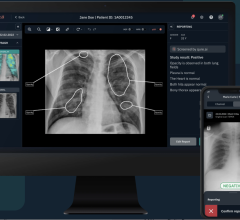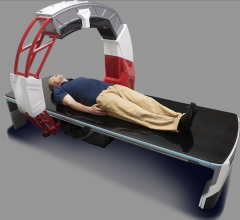
February 3, 2009 - The Image Gently campaign has developed new materials to educate parents about medical imaging and to help them track their child’s past imaging exams, in an effort to continue to raise awareness about opportunities to lower radiation dose used in pediatric imaging exams.
Pediatricians and other physicians are encouraged to download the materials from the Image Gently web site, www.imagegently.org, and make them available to parents in their waiting rooms and offices. A special section of the Image Gently web site will also be dedicated to providing parents with the most up to date information regarding children’s imaging and tools to help them understand the benefits and concerns associated with medical imaging procedures.
“Radiologists, radiologic technologists and medical physicists are committed to working together to lower radiation dose used for CT scans in children. We also want to work with pediatricians and parents to help ensure that children get the most appropriate imaging for their medical situation,” said Marilyn Goske, M.D., chair of the Alliance for Radiation Safety in Pediatric Imaging, past Board Chair of the Society for Pediatric Radiology, and Silverman Chair for Radiology Education, Cincinnati Children's Hospital Medical Center.
“My Child’s Medical Imaging Record” allows parents to record where and when a study was performed as well as the type of radiologic exam. This can help their future medical providers make more informed decisions regarding optimal timing of additional radiologic examinations.
“‘My Child’s Medical Imaging Record’ card enables parents to help their physicians to provide the highest possible benefit by ordering the most appropriate exams while avoiding unnecessary potential risk to the child,” said James H. Thrall, M.D., FACR, chair of the American College of Radiology Board of Chancellors.
“What Parents Should Know About CT Scans for Children: Medical Radiation Safety” and “What Parents Should Know About Medical Radiation Safety” are downloadable patient education brochures. These provide lay definitions for various imaging exams, which utilize radiation informing parents of potential risks associated with these studies. They provide dose estimates in comparison to natural background radiation, discuss possible alternative examinations that do not utilize radiation, and equip parents with questions to ask their imaging providers so that they can make better informed decisions regarding their child’s care. The imaging record card and the patient brochures are available at www.imagegently.org.
“We believe parents want to work with their pediatrician to learn about CT scans prior to their child having the study. The parent information pamphlets and medical imaging record card available on the Image Gently website enhance parents’ participation in their child’s health care and improve health literacy by enhancing communication. We invite radiologists and pediatricians to download the information packets and medical record card and distribute them in their waiting rooms and offices “stated Dorothy Bulas, M.D., professor of Radiology and Pediatrics at the Children’s National Medical Center in Washington, DC, who is leading the parent component of the Image Gently campaign.
“Parents can make better health care decisions on behalf of their children if they are armed with the correct information. Although medical imaging is increasingly replacing more invasive techniques in all areas of medicine, its risks and rewards may not be entirely understood. These brochures can help allay parents’ concerns and help them give better information to providers so that they can make the best possible diagnostic and treatment decisions for their child,” said Gerald A. White Jr., MS, FAAPM, chairman of the board of the American Association of Physicists in Medicine.
“Radiologic technologists are the final link in the chain as they perform CT scans,” said Connie Mitchell, M.A., R.T. (R)(CT), chairman of the board for the American Society of Radiologic Technologists. “These patient education brochures can provide valuable insights to parents to help them better understand why technologists ask them particular questions and can give them a better context for providing more thorough and productive answers that will help us provide better care.”
For more information: www.imagegently.org


 August 09, 2024
August 09, 2024 








